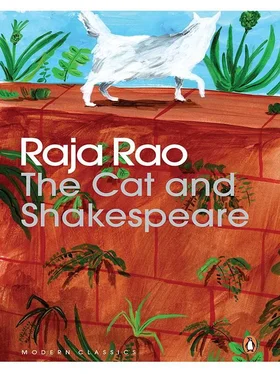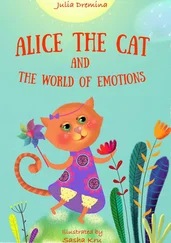Rao Raja - The Cat and Shakespeare
Здесь есть возможность читать онлайн «Rao Raja - The Cat and Shakespeare» весь текст электронной книги совершенно бесплатно (целиком полную версию без сокращений). В некоторых случаях можно слушать аудио, скачать через торрент в формате fb2 и присутствует краткое содержание. Год выпуска: 2014, Издательство: Penguin, Жанр: Современная проза, на английском языке. Описание произведения, (предисловие) а так же отзывы посетителей доступны на портале библиотеки ЛибКат.
- Название:The Cat and Shakespeare
- Автор:
- Издательство:Penguin
- Жанр:
- Год:2014
- ISBN:нет данных
- Рейтинг книги:4 / 5. Голосов: 1
-
Избранное:Добавить в избранное
- Отзывы:
-
Ваша оценка:
- 80
- 1
- 2
- 3
- 4
- 5
The Cat and Shakespeare: краткое содержание, описание и аннотация
Предлагаем к чтению аннотацию, описание, краткое содержание или предисловие (зависит от того, что написал сам автор книги «The Cat and Shakespeare»). Если вы не нашли необходимую информацию о книге — напишите в комментариях, мы постараемся отыскать её.
The Cat and Shakespeare — читать онлайн бесплатно полную книгу (весь текст) целиком
Ниже представлен текст книги, разбитый по страницам. Система сохранения места последней прочитанной страницы, позволяет с удобством читать онлайн бесплатно книгу «The Cat and Shakespeare», без необходимости каждый раз заново искать на чём Вы остановились. Поставьте закладку, и сможете в любой момент перейти на страницу, на которой закончили чтение.
Интервал:
Закладка:
Shridhar knew his father as he knew his textbook. (He always stood second or third in class. He was in the fourth form.) A cigarette was bought from the neighbouring shop, and a matchbox. Sitting by the window, Govindan Nair lit his cigarette, while Shridhar returned to give back the matchbox to the shopkeeper — then, coming back, he started fanning me again. I said, ‘I must build a house of three storeys anyway. My wife can hire out the first two floors if need be. It will be so much capital invested. A house of three storeys these days is a safe investment. How much would it cost? One can live on the third floor.’
‘Thirty thousand rupees, if there’s no inflation after the war,’ Govindan Nair declared. ‘Let’s begin buying this house, for the moment. A bird in hand is worth two in the bush. Govindan Nair in Trivandrum is worth two wives in Kartikura House. Isn’t that so, brother?’ he said, but looking towards the wall, he saw Tangamma hide her mouth with the palm of her hand, and laugh.
I have developed a bad habit. I like women. Not that I like all sorts of women. I like woman, in fact. What is woman, you may ask. Well, woman is Shantha. Shantha is a school teacher in the Nair Society High School. She is fairly tall, and has delicate hands. I am not particularly tall or fair or good or bad. I am just a man. And Shantha is not just a woman, she is woman. I think often of the child she will bear forth (that is, when he will appear), and I cry with delight even before the time is come. Shantha lives with her mother and two brothers round near the Poolimood. The brothers go to school. The mother cooks. Shantha earns (they have some property too, in north Travancore). Shantha also loves. Her house is not far. Only in monsoon are the roads very difficult. Even so we somehow manage to be with each other. I can cough just a little, then Shantha will put her pillow against my neck. That is why she is so exquisite in her love play. She is shy like a peahen. Her giving is complete. But the truth is, who is there to take? Can you? There’s a story said of Sinbad the sailor. He was told by the jinn: Take, take all the royal treasury. He opened his hands to take. The hands had changed into gold. (I read this in my old school text). That’s taking. Saroja of Kartikura House is a true Brahmin. She knows how to take. But Shantha is a Nair. Nairs worship their mothers and recognize their fathers. I liked my father and had affection for my mother. The world has to be worshipped. Shantha worships me and has herself. I worship nothing (no, not even money, although it will make the three storeys possible), and I don’t think I care for anything. Caring for nothing is to use everything for oneself. Caring for oneself is to give things their self. Shantha loves me, and so she will have a beautiful boy. She’s not worried about marriage. I am a Brahmin. Shantha is not ashamed to be woman. I am afraid to be a man.
That is why I carry Shantha so badly on my face. When Govindan Nair wants to speak of her, he simply says, the Vazhavan-kad house (Vazhavan is a small hamlet in north Travancore). He calls her by her house name as if her house were she. In fact her house is she. To speak the truth, that is how I met her. She came to the Revenue Board about some land division. She looked so innocent, I told her to sit down and immediately took out her file. She was sure her case was right for she could not know how her face might ever be wrong. Might she think of anything wrong? She was certain she could not. So truth became her thought. If she said, ‘Come to me’—it meant come. If she became my mistress it was because she felt wife. She remained a wife. My feet were there for her to worship. My weaknesses were there for her to learn; my manhood, at least such as I possess, for her to bear children. She had never touched any man before. She said she knew me to be her man the moment I went and stood against the filing ladder. For a woman love is not development. Love is recognition. The fact that my intestinal troubles improved after I met her proved she was right, so she felt. Devotion to me was proof of her truth. The child was meaning. The woman is always right.
Who told Shantha then that I had fallen unconscious? She said my son (in her) told her so. She went to Govindan Nair’s house, and she and Tangamma stood at the wall, while Shridhar came to open my window. Shantha would never come to me. How could she come to my wife’s house? She looked from under the bilva tree, her figure square and big, and I could see tears fall from her eyes. She seemed to be more in prayer than in sorrow; her skin shone like black ivory, so it had the colour of blue. I could almost (I used to tease her) see the white hands of the child inside of her (for I am sort of Brahmin-fair). Will this illness affect the child? I must build a house, a house three storeys high.
Destiny brings to us little slips of paper, as the office peon does from some visitor or the boss. What does a name really mean? The British bubo is a name given by my friend Govindan Nair to an unknown phenomenon of physiological eruption, when pus and blood seem to rise on the skin, round themselves up like a country mango, and split, and the flies and the lizards have the feast. Now that the bubos are finished, tell me, who will feast the lizards? Who will feed the bacilli, if indeed it was a bacillus and it came from Benghazi? Is it really so hot in Benghazi? What made some autonomous invisible crawly active entity enter into an Indian soldier in his wars with Hitler and Rommel, burst into a million bloody worms which having travelled through boats, trains, restaurants (through the files of the sanitary inspectors’ reports), penetrate into some flies perchance that sat on a cow whose milk my milkman brings, and, having gone into my intestines where the bacilli field was relatively vacant (like an empty conference room, chairs and tables set out and the meeting might begin at any time and the resolution be passed), give me, sir dear sir, my beautiful British bubo? Everybody must do something — the clerk must correct his files, the fleas must bite. Illness come, and one goes to Narayan Pandita Vaidyan, and the horse-dung medicine is given. I go for the purge, the sun is hot, I tumble against the threshold and fall. And that’s Shridhar’s death. For him an unconscious state is death. What is sleep then to Shridhar?
Poor Shridhar was also ill. He had malaria (or was it filaria?) — another flea bite. So he did not go to school. One goes to school when one is well (and when Uncle is not ill). Thus the two flea families had made a pact. Across the wall they said to each other: ‘We will change the world. You come from Benghazi and I come from, say, Uzhavezhapuram. We met and we shall play destiny.’ Invisible are the ways of destiny. Food will go across the wall — Shridhar will not go to school. ‘Pappadam and rice will I take down to Uncle.’ The bilva tree will bless.
Shantha is carrying four months. I can just see the rise in her belly, from where I lie. Her smile is freedom of the world. It is trust in herself. She looks in as I look out (as Shridhar does). To trust is to be. She can lean against the wall whispering out words to me, as if the world would create itself to her wishes for me. She created a child for herself and gave it to me. She said, ‘This is yours.’ And that is the truth. Who can create a child but God. What is the relation between God and Shantha?
‘I go and come.’ Shantha smiles from the wall. She, as it were, bows to me behind her back. Then slowly I hear the leaves of the jack trees crunch under her. I now see the head first, blue as sky, then the hair (with flat big chignon), and then she is gone. For a long time I go on listening to myself like a lizard. It is beginning to be hot already. Tangamma sends Shridhar with some coffee to console me. Then Govindan Nair (with sandal paste on his forehead and his packet of betel leaves and tobacco) jumps across the wall.
Читать дальшеИнтервал:
Закладка:
Похожие книги на «The Cat and Shakespeare»
Представляем Вашему вниманию похожие книги на «The Cat and Shakespeare» списком для выбора. Мы отобрали схожую по названию и смыслу литературу в надежде предоставить читателям больше вариантов отыскать новые, интересные, ещё непрочитанные произведения.
Обсуждение, отзывы о книге «The Cat and Shakespeare» и просто собственные мнения читателей. Оставьте ваши комментарии, напишите, что Вы думаете о произведении, его смысле или главных героях. Укажите что конкретно понравилось, а что нет, и почему Вы так считаете.












